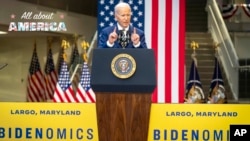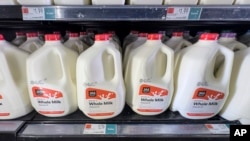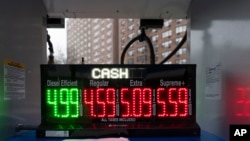The U.S. economy ended 2023 on a positive note, most economists seem to agree. Growth is up, jobs numbers are strong, and inflation is at a three-year low.
“Overall, it's been doing really well. The GDP has been growing. We didn't have the recession that a lot of us have been anticipating,” says Selcuk Eren, a senior economist at The Conference Board, a research group. “Unemployment has been under 4% for, I believe, 23 months in a row now. That is the new record.”
Despite those robust numbers, most Americans, 68%, say the economy is worsening, according to a December 2023 Gallup poll, which showed that four in five U.S. adults rate the country’s current economic conditions as “poor” (45%) or “fair” (33%). Only 19% of people polled said the economy is “good,” in keeping with the positive economic markers.
“Sometimes, real people don't think about that. They just think about how much they're spending out of their pockets, on the groceries, on the rent. … I think that's one reason we don't see the positive impact of the economy in the surveys that we are looking at,” Eren says. “Inflation is really, really miserable for everyone, and it impacts everybody at the same time.”
A January 2024 poll found that 90% of Republicans, 74% of independents, and 49% of Democrats, agree that the economy is in bad shape. The same poll found that just 31% of people approve of Biden's handling of the economy, while 56% disapprove.
However, Justin Wolfers, a professor of public policy and economics at the University of Michigan, questions the accuracy of polls and says people’s actions suggest they believe the economy is doing well.
“How would we figure out if the American consumer were in fact optimistic? I think the first thing you do is you look at consumption spending, because if you expect the economy to be terrible, you’d squirrel away money for this coming recession,” Wolfers said. “But instead, people have been spending money as if they believe, not only is the economy good, it’s going to continue to be good.”
It’s also possible that people’s political preferences impact how they answer questions about the economy.
“There's something internally incoherent about the polling that we're seeing where people are essentially allowing their feelings about the president to essentially govern their feelings about the economy,” said Greg Ip, chief economics commentator at The Wall Street Journal.
Ip and Wolfer spoke at a recent online symposium organized by the Brookings Institution and moderated by Sara Eisen, an anchor on cable business news channel CNBC.
“When I talk to people — big investors, CEOs — they don't give Biden huge credit for the economy,” Eisen said. “They say it's happening despite him because his policies are all liberal, and he wants to raise taxes, and he wants to raise corporate taxes, and he wants to get rid of oil producers in this country, and all these things that are bad for the economy.”
But Selcuk says Biden, as well as his immediate predecessor, Donald Trump, enacted policies that helped the economy. Biden’s Inflation Reduction Act of 2022 aimed to curb inflation by reducing the federal government budget deficit. Other moves that kept the economy growing, despite massive layoffs during the COVID-19 pandemic, include extended unemployment benefit payments, one-time tax credits and direct payments to American households.
“We were able to recover very fast from these huge job losses during the pandemic,” he says. “If there was no government intervention, we could have had those jobs not be recovered that quickly, and the unemployment rate could have been really high for a long time. So, definitely there’s lots of positives. Some of them started in the previous administration and continued until now.”
Another reason people might be feeling down on the economy could be related to some of those pandemic-era benefits expiring.
“For almost four years, there were no student loan payments. Now, it's coming back slowly. That's something that's going to impact people negatively,” Selcuk says. “When people have something and then it’s not there anymore, even if that something was known to be temporary, once you take that away, that creates a negative feeling.”
But there are early signs that Americans are starting to feel better about inflation, which hit a 40-year high in 2022, and is now at its lowest — about 3% — in three years.
A January 2024 survey finds that consumers appear to be gaining confidence that inflation has turned a corner. Positive consumer sentiment is at its highest level since 2021, a development that suggests the gap between consumer perception and that of the economic experts is starting to narrow.







